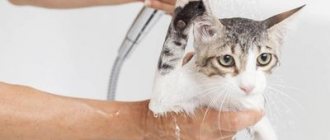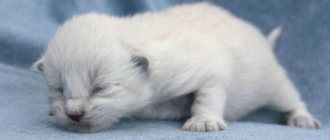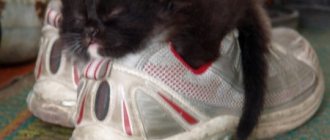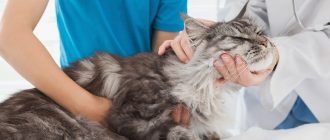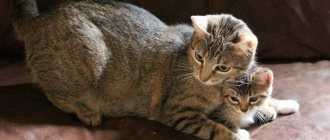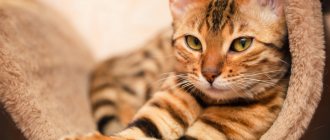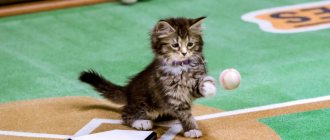19061Administration
How to train a pet to use a litter box? How often do kittens go to the toilet? Why do problems with stool and urination occur? Similar questions regarding proper care and maintenance most often worry owners and breeders of furry purrs.
more often than older dogs
Undoubtedly, a kitten needs care, attention, and proper care. At the same time, one of the important factors in the health of your beloved pet is the functioning of the digestive tract and genitourinary system. Let's consider how many times a day a small kitten should go to the toilet, what is the norm and what is a deviation.
General information about the kitten's toilet
How long should a kitten poop? It is important to know the rate of bowel movements in order to protect your furry baby from health problems.
One month old kittens can poop on their own 3-6 times a day. When changing place of residence, the pet may not poop for about 5 days. After an adaptation period, the stool usually returns to normal, otherwise it is worth taking action.
You can give your pet a light massage of the abdomen and groin area
For your information! The toilet of a newborn kitten is under the complete control of the mother cat. The first three weeks after birth, the cat licks the baby. At the same time, not only body hygiene is observed, but also stimulation of blood circulation and the functioning of the digestive organs.
While licking, the cat uses its rough tongue to massage the belly and groin area. Thus, the sphincter of the anus and the urinary canal are irritated and relaxed, resulting in urination and defecation. The cat licks all the discharge, so the owners cannot detect traces of the kittens’ bowel movements for the first time after their birth.
Sometimes inexperienced females do not properly care for their babies. Your kitten may suffer from a bloated belly where feces and gases have accumulated. The owner can come to the aid of the baby. It is enough to take a brush, bandage or a little cotton wool and gently massage the groin area. This will help the kitten go to the toilet and get rid of discomfort.
To improve digestion and remove gases, you should massage your stomach using circular movements.
Why do problems with stool occur?
If an older kitten with well-opened eyes eats and drinks well, but cannot walk around every day, then there are the following reasons for this:
- Stress. Very often, a kitten suffers from constipation due to stress. Early weaning from a cat has a particularly difficult effect. The kitten, missing its mother cat, sometimes experiences difficulty passing stool for 5 days. If kids in a new home cannot go to the toilet on their own during this time, then there is nothing wrong with that. If the situation does not resolve after 5 days, then you need to visit a veterinarian. You need to try to make the cat calm down; as soon as he gets used to his new place of residence, the situation should resolve itself.
- A kitten may have difficulty passing stool if it has an improperly balanced diet. When a cat finds itself in a new home, you should try to initially stick to the same menu as the old owners. It is best to use specially formulated food for babies. When a cat eats natural food, it is better to include plant foods, boiled meat, and cereals. After the new owners select suitable food for the babies, they themselves begin to go to the toilet. How many times a cat goes to the litter box depends on what it eats. He can go up to 4 times a day if he eats food rich in fiber; when eating meat, cats visit the litter box about 2 times a day.
- Another common cause is constipation. When a kitten cannot poop for about a week, it may have a health problem, which led to the development of a similar situation. In this case, the pet must be shown to a veterinarian; only he can correctly assess the situation and prescribe treatment.
When planning to have a furry pet, future owners must understand the responsibility they take on for the life and health of their beloved cat. It is very important to provide proper care, create optimal living conditions, and think through the diet. The period of adaptation and socialization should be favorable, without stress. Any negative factors can weaken the immunity of animals and provoke changes in behavior and the functioning of internal organs and systems.
If an older kitten has a normal appetite, eats well, but there is no bowel movement, the fluffy does not go to the toilet, this condition can be provoked by various factors.
- Stress. A change of place of residence, a trip to the veterinary clinic, the presence of other animals in the house, and other stressful situations can lead to the absence of defecation. The kitten may not poop or go to the toilet for two or three days.
- Early weaning from the cat. Missing his mother in his new home, the fluffy may experience problems with bowel movements for up to four to five days. This is normal, but if the situation does not change, seek help from a veterinarian.
- Unbalanced nutrition, sudden changes in diet, consumption of foods rich in protein. In the first weeks and months, try to give your pet the same food that he received from his previous owners. Introduce new products gradually. You should not change your diet suddenly. If the baby is kept on a natural diet, do not suddenly switch the animal to ready-made food.
- Helminthic infestations. Constipation in young kittens can be caused by worms. Intestinal parasites disrupt digestive processes, worsen general condition, and can cause intestinal blockage.
You need to accustom your kitten to new foods and solid food gradually, in small portions. In order not to disrupt the digestive processes, solid food should be crushed and mixed with milk and boiled water to a creamy consistency.
Important! For kittens aged three to five weeks, the food used for complementary feeding should be at room temperature, liquid, semi-liquid consistency.
If your baby cannot poop for more than five to seven days or experiences discomfort during bowel movements, consult your veterinarian. The cause of this condition can be health problems, systemic disorders in the functioning of internal organs and systems. If your kitten often suffers from constipation, consult your veterinarian and adjust your pet’s diet.
READ Eye diseases in cats: causes, symptoms, how to treat, prevention
How often should a kitten poop: normal bowel movements by age
The cat often goes to the toilet a little at a time
How many times a day should a kitten go to the toilet? Normal bowel movements depend on many factors. One of the main ones is age. The gender of the kitten and its health status are also important.
- at the age of 1-21 weeks, the norm of bowel movements is 3-4 times;
- at the age of 3 to 6 months - 2-3 times;
- over the age of 6 months - 1-2 times a day.
Three-week-old kittens should normally be fed their mother's milk with the gradual addition of solid food. Their feces have a thick and mushy consistency without foreign impurities. There should also be no undigested pieces of food in the stool. A deviation from the norm is considered to be too loose or too dry stool.
The older the kitten, the less often he defecates.
Adult kittens up to three months old are transferred to adult food. As a result, the nature of their bowel movements changes. The feces take on clearer shapes and become thicker. The frequency of visiting the tray depends on the nature of the food. When eating plant fiber, bowel movements occur more often, unlike animals, whose food mainly consists of protein.
Important! The feces of a three-month-old kitten should be of medium thickness without foreign impurities. Too frequent bowel movements or loose stools indicate some kind of disorder in the body.
Females and males go to the toilet differently. Cats pee more often. This is due to the physiological characteristics of the urinary tract. In males they are narrower and longer than in females. If your cat's diet is rich in fiber, he may go to the toilet more often.
When do kittens start pooping and peeing?
Kittens begin to go to the toilet from birth. However, the owner may not notice this, because the mother cat quickly licks the feces with her tongue.
She uses her tongue to help her baby poop and pee, licking the belly, anus and genitals with her tongue. The warmth of the tongue, its rough surface and circular massaging movements stimulate digestion and relax the sphincter.
At first, kittens' stool looks like a creamy paste, and they pee as a colorless and odorless liquid. When the pet gets used to more solid food, its stool changes.
How often should kittens pee?
What to feed a kitten for 2 months: how many times a day and what food
Veterinarians give owners of small kittens a simple rule that helps determine normal urination in their pets. The essence of the rule is that the amount of fluid entering the body must be equal to the fluid excreted in the urine. The baby has a small bladder, so he will go to the toilet in a small way more often than an adult cat.
The rate of urination also depends on the age, gender and health status of the children:
- at the age of 1-21 weeks, a kitten can pee about 3 times a day;
- animals 3-6 months old defecate 6-10 times;
- Pets older than 6 months pee on average up to 5 times.
With the introduction of complementary foods, kittens can be litter trained
When visiting the toilet, the owner must monitor the quality of urine. You need to pay attention to color, transparency, the presence of blood or mucus impurities. It is also worth noting the process of urination. Normally, it should be comfortable and painless for the baby.
If the kitten, on the contrary, rarely goes to the toilet
Even adult cats defecate at least once a day. If a pet does not walk normally for the second day, this indicates that there are some problems in its body. Constipation can be caused by the following factors:
- Stress. Sources of stress can be factors that are unusual for a small animal: separation from the mother, from the previous owner, noise, small children.
- A sudden transition to a new food. The change in food should occur gradually so that the pet has time to get used to it.
- Diseases of the gastrointestinal tract.
- Consume small amounts of fluid.
- Parasites in the body.
- Malnutrition.
- Uncleaned tray.
The problem must be solved depending on the cause that caused it.
If the animal does not defecate for more than 5 days, a visit to the doctor is necessary. Possible intestinal diseases.
You can help your pet with a belly massage. The cat washed the newborn with its tongue and helped him go to the toilet. The situation can be recreated if you take a cotton pad and, moisten it in warm water, move it over the abdomen, genitals and anus. The procedure should be repeated every hour, each time placing the kitten in the litter box.
Pathological deviations from the norm
How often can you wash a cat - how many times a month and examples of when not
The animal may experience abnormalities in normal urination. Veterinarians distinguish between safe and pathological cases. Safe ones include:
- stress caused by moving or the appearance of a new pet or stranger in the house;
- acclimatization;
- change of feed;
- procedure of castration, sterilization or other surgical operations.
All these factors are temporary. After an adaptation period, the number of urinations returns to normal.
You should take full responsibility for kittens who have begun to go to the toilet less often for more serious reasons. Such children usually exhibit abnormalities resulting from the development of various pathologies. If the cat cannot pee for more than two days, or the process itself causes her pain, or the amount of urine is very small, then it’s time to seek help.
The main cause may be an inflammatory process in the genitourinary organs. Signs of pathology are:
- plaintive meowing when urinating or inability to go to the toilet;
- presence of traces of blood, sand or mucus in the urine;
- lack of urination;
- scanty discharge;
- lack of appetite, apathy;
- increased body temperature;
- swollen belly;
- dry and hot nose and ears.
Deviations from the norm can be caused by pathologies in the body
If there is difficulty urinating, the kitten may take a characteristic position while in the tray. It is worth remembering that an animal may not go to the toilet if it is dirty or if it does not like the litter in the tray. Pathological deviations from the norm require immediate contact with a veterinarian. If you let the situation take its course, the kitten may die.
What should owners be wary of?
Since small kittens, adult cats, and cats like to relieve themselves in secluded places, it is not always possible to track how many times a day the pet visited its litter box or went to the toilet. Therefore, from the first days of the animal’s appearance in your home, after the completion of the adaptation period, as soon as the cat begins to trust you and gets used to the new environment, carefully monitor its behavior, habits, and general physiological state.
If the kitten is active, cheerful, gaining weight well, the tummy is soft, the fur is shiny, and the pet goes to the toilet normally - there is no reason to worry.
If kittens poop frequently, the stool is loose, has a specific sharp unpleasant odor, and foreign impurities are noticeable, contact your veterinarian for help.
The following symptoms should alert owners of furry pets:
- decreased overall activity;
- inadequate response to external stimuli;
- uncontrollable behavior of a pet;
- deterioration of coat;
- rare visits to the tray;
- enlarged, large, tight tummy;
- nausea, vomiting, diarrhea;
- decreased appetite;
- increase in body temperature.
Feces that are too thick, brownish-green, dark or, conversely, too light in color may indicate disturbances in the functioning of the gastrointestinal tract. The problem requires an immediate solution to avoid serious consequences.
What to do if there are deviations
Violation of the frequency of toilet visits by a small kitten is usually associated with stressful situations. Such factors disappear by themselves when the animal goes through an adaptation period. The situation is more complicated when urination is impaired due to health problems. In this case, the kitten can either walk too often or too rarely.
Frequent urination
If a kitten pees frequently, then most likely he has developed cystitis, a disease of the urinary organs, or urolithiasis. The baby will often run up to the tray, but the volume of urine will be catastrophically small. Sometimes there is blood in the urine.
Frequent urges can be caused by drinking too much in hot weather, as well as diabetes. Urinary incontinence is accompanied by a large amount of fluid released and no bleeding. The same signs are characteristic of marking territory.
Cystitis most often occurs in adult kittens. The reasons may be:
- drafts;
- sand in the kidneys;
- impaired metabolism;
- mineral imbalance;
- sexual infections;
- predominance of dry food, lack of liquid and proteins.
Deviations from the norm should be studied and treated in veterinary clinics
Cats of any age can get urolithiasis. Signs of the disease are:
- unsuccessful visit to the tray;
- a tiny amount of urine;
- presence of blood in the urine;
- vomiting and high fever;
- lethargy and apathy.
There are cat breeds that are genetically predisposed to this disease. Among them are Scottish Fold, Persian and Siamese breeds.
Also, frequent urination can be associated with diabetes, stress or enuresis. In any case, assistance to the pet must be qualified and timely. If there is the slightest sign of a pathological condition, you should immediately contact a veterinarian. He will prescribe a number of diagnostic measures and adequate treatment.
A kitten who pees frequently will undergo the following tests:
- blood biochemistry;
- Analysis of urine;
- X-ray;
- comparison of the amount of urine and drink;
- Ultrasound;
- hormone test;
- determination of acetone levels and acid-base balance.
These types of studies will help to identify the nature of the disease of the genitourinary system, make a diagnosis and decide on treatment.
In addition to adequate therapy, it is important to carry out a number of preventive measures for the full functioning of the genitourinary system. Regular medical examinations, proper diet, physical activity, and the optimal amount of drinking will ensure normal urination and healthy urinary tract of the kitten.
Too infrequent visits to the litter box
Rare urination is just as dangerous to a kitten's health as frequent urination. In such situations, the main cause is pathological processes, both in the genitourinary system and in the body as a whole. Almost 75% of cases of insufficient urine flow or insufficient discharge occur due to cystitis. Lack of proper treatment will invariably lead to a condition such as acute urinary retention.
Having such a diagnosis, a kitten may not walk for more than a day. This is a dangerous phenomenon that often ends in death. The bladder becomes full and bursts. Urine enters the abdominal cavity, which can lead to intoxication of the body and death of the pet.
Kittens need to be fed crushed food.
The pathology most often occurs in male kittens. For females, such a disease is not typical, although it is also sometimes detected. The main cause of the disease is stones that block the urinary tract. Experts identify other factors:
- blockage of the urethra by a blood or mucus clot. Occurs against the background of trauma to the genital organ or an infectious disease, in particular the bladder;
- abnormal kidney function. With renal dysfunction, the kitten’s body can no longer excrete urine even in minimal volumes. The cause may be a malignant tumor or perforation of the kidney;
- spinal injury or infectious disease affecting the spinal cord. The absence of a nervous connection between the genitourinary organs and the spinal cord leads to disruption of their functioning and the cessation of urination of the animal.
Urinary retention of any stage requires urgent treatment. In the clinic, a kitten may be prescribed the following procedures:
- catheterization using a special catheter that is inserted into the urethra. This will help empty your bladder;
- surgical intervention. Prescribed in case of ineffectiveness of repeated catheterization.
To prevent advanced cases of impaired urination, the owner of kittens must take preventive measures daily:
- animals must receive anti-infective vaccinations on a schedule;
- avoid hypothermia;
- provide access to an unlimited amount of fresh and clean water;
- the diet must comply with the kitten’s nutritional rules according to its age;
- an active lifestyle and outdoor games will also be beneficial.
For any pathological conditions or deviations from the norm, it is prohibited to prescribe medications yourself. Kittens must be treated by a veterinarian. He will also tell you how many times a kitten should poop and pee per day. This will keep your little pet healthy and alive.
Accustoming a kitten to adult food and litter tray
Starting from the 22nd week of a kitten’s life, it can be gradually introduced to complementary foods. To do this, you can use special canned food for kittens. If food is prepared independently, then the baby should be given it chopped. Gradually, the amount of mother's milk in the kitten's diet decreases, and it completely switches to adult food. At this time, his feces change their structure and shape. They become more formed and dense. At the same time, it is advisable to start accustoming your baby to the tray. The toilet should be placed next to the box where he lives and sleeps. The sides of the tray should be low so that the baby can climb into it himself. It is better to choose crumbly filler. This will help the kitten develop a digging reflex and get used to the toilet.
The frequency of replacing the litter in the tray depends on how often the kittens poop and pee.
The ideal option would be to help a mother cat. Kittens willingly follow the example of adults. If a cat goes to the litter box when the baby is present, the kitten will quickly learn to do this on its own. Over time, the tray can be moved to another more suitable location.
Host mistakes
You can find out how often a kitten poops at 2 months by how many times it visits the litter box. But the animal does not always choose a pot to satisfy its natural needs. This may be the owner's fault. Here is a list of possible reasons:
- Late trained to use the tray. The most optimal age for this is one month. Later it will be more difficult.
- Dirty pot. If you don't clean the litter box in time and change the filler, the kitten may go somewhere else. Remember that cats are clean animals!
- Wrong place. If the litter box is in a place that scares and the kitten doesn't like, he won't go in it.
- Another tray. If you decide to change your pet's litter tray, be prepared for the fact that he may refuse to relieve himself in the new one. In this regard, cats are monogamous.
- Foreign odors. The cat may not like the smell from the potty, and therefore he will refuse to go into it. Therefore, you need to exclude all flavors and wash the tray with plain water. It is also forbidden for several animals to go into one tray.
- Don't punish. This method will not help you accustom your pet to the tray, but will only instill fear of the owner.
- Doesn't shit where he eats. If your pet has chosen another place as a toilet, make his dining room there, after washing everything with odor eliminating products.
- Health problems. If you follow all the rules, but the kitten still shits in the wrong place, you should contact a veterinarian.
Signs that a kitten wants to go to the toilet
Many owners have kittens growing up without a mother cat. In such cases, training and litter box training are the responsibility of the owner. First of all, a person should know when the kitten wants to go to the toilet. At this moment, the animal gives specific signs. It's important to just keep an eye on it. The baby wants to go to the toilet if:
- scratches on the floor and other objects;
- sniffs everything around, looking for a place to defecate;
- stomps around in one place, meows subtly and sits down;
- With a strong desire to go to the toilet, the kitten's eyes become glassy. The owner should know that the baby urgently needs to be placed in the tray.
Tray training should be leisurely. It is important to change the litter on time, as the kitten may refuse to go to a stale toilet. Do not neglect to pay attention to the feces and urine of the animal, to see if there are any foreign impurities, pus, worms, blood or mucus. Timely identification of the problem and contacting a veterinarian will prevent the occurrence of serious diseases and complications, which in the future can lead to intractable health problems and even the death of a small pet.
Preventing constipation in kittens
You need to avoid excess protein, select high-quality dry food, or prepare your own food so that it is balanced. The first weeks after the move, you should give the same food that the cat is accustomed to from the breeder. Babies fed on natural food should not be suddenly switched to dry food. Cats go to the toilet more often if they have enough fiber in their diet. The animal should always have access to clean water.
Active games with your pet will be beneficial. You don't want your cat to become too passive. To interest your pet, you should buy different toys.
Small objects should not reach the cat. If there is a child at home who scatters small beads and toys, you should clean up what is scattered after him. Objects can become lodged in the intestines, causing partial or complete blockages that sometimes result in the death of the pet.
It is recommended to regularly show the animal to a veterinarian. Examinations will help detect pathologies in the early stages and take timely measures.
